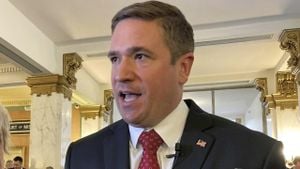With the inauguration of Donald Trump as President of the United States, the nation’s approach to energy policy and climate change is set for dramatic shifts. Trump's administration is not just poised to dismantle many of the existing frameworks for addressing climate issues, but also to push forward with fossil fuel dominance, as evidenced by his recent appointments and policy declarations.
Central to this energy agenda is Trump's selection of Chris Wright to head the Department of Energy. Wright, the founder and CEO of Liberty Energy, is known for his staunch advocacy for fossil fuels and has publicly dismissed concerns about climate change altogether. Gearing up for his leadership role, he has not held back from expressing his views, labeling the climate crisis as non-existent. "There is no climate crisis, and we’re not in the midst of an energy transition, either," he proclaimed on his LinkedIn profile last year. His rhetoric and actions suggest he will align closely with Trump's goal of maximizing oil and gas production.
Wright's views are reflected not only through his comments but also by his history. He garnered media attention when he famously drank fracking fluid on camera to assuage public fears about the safety of fracking. Under his leadership, the Department of Energy is poised to continue initiatives focused on increasing fossil fuel production, potentially exacerbated by Wright’s connections to major oil and gas interests.
The challenges facing American agriculture amid shifting climate patterns and severe weather are likely to collide with Wright's policies. The agricultural sector is increasingly confronting the effects of climate change, leading to calls for more sustainable practices. There's widespread concern as within the last eight years, climate disasters have cost farmers billions. It raises the question of whether Wright's focus on fossil fuels will serve the needs of farmers dealing with the reality of climate vulnerabilities.
Similarly, Trump's choice of Brooke Rollins to lead the Department of Agriculture sparks apprehension among those advocating for environmental regulation. Rollins has demonstrated her skepticism toward climate science, previously promoting the idea of withdrawing from international climate agreements and pushing back against regulations aimed at reducing emissions. Critics have expressed concern about how her appointment will impact existing initiatives, which have seen substantial federal investment aimed at making agriculture more resilient to climate change.
Many of the climate initiatives and spending proposed during the Biden administration could be subjected to scrutiny or outright reversal under the Trump administration. Notably, Ohio received significant funding for climate projects during Biden's term, with about $3.7 billion allocated to combat climate change and promote sustainable agricultural practices. Experts suggest once contracts are signed for these projects, they are likely to proceed unhindered. Nonetheless, the uncertainty surrounding future funding remains, as projects initiated under Biden’s administration may not align with Trump's priorities.
The shift from federal funding to support for fossil fuels is likely to continue to garner significant backlash, especially from those who have already received funding through previous climate-focused projects. For example, the USDA recently allocated $3 billion to climate-smart agricultural practices, which aimed at incentivizing farmers to adopt sustainable practices, drawing significant interest within the agricultural community. Yet, under Rollins, there’s fear these incentives could be retracted as her skepticism about climate science may lead her to slow or halt funding for these programs.
Meanwhile, the political dynamics reveal how even established agricultural lobbying groups are shifting their stance on climate issues. The American Farm Bureau Federation, which once denied the link between agriculture and climate change, has softened its stance, recognizing funding for sustainable practices can benefit their members. This evolution indicates even the most resistant industries are adapting to economic pressures stemming from climate realities.
Wright's position remains precarious, as he will have very little time to make sweeping changes to policies conceived under the previous administration. Perhaps more critically, his approach to combating climate issues may not resonate well with many who are witnessing firsthand the destructive effects of climate change on their livelihoods.
Plans for new liquefied natural gas export terminals could see renewed momentum under Wright, aiming to capitalize on high international demand for U.S. gas, particularly from Europe and Asia. His promises suggest he will not shy away from fast-tracking the approval process to meet this growing demand, reiterative of Trump's vision to restore American energy dominance through fossil fuel exploitation.
By prioritizing deregulation and investment back toward the fossil fuel industry, the Trump administration's approach may clash with environmental goals. Despite the increasing urgency of climate change, there are fears the agenda will pivot back toward traditional energy sources, complicity encouraging higher emissions.
The general sentiment paints the incoming administration as one favoring fossil fuel interests, raising alarms among climate activists and sustainability advocates. This prevailing narrative under the new Trump leadership fosters anxiety and uncertainty, especially for sectors heavily impacted by climate variations, including agriculture and various rural communities.
The looming questions remain: what will be the fate of federal climate resilience programs, and how will Trump's administration navigate the clear necessity for sustainable practices amid the rapidly deteriorated climate reality? The impending shift not only signifies policy overhauls but also poses new challenges for legislative efforts aimed at combating climate issues moving forward.
Maintaining energy dominance, Trump's administration seems set on radical changes, as Wright's influence is expected to extend broadly, pushing back against previous regulatory frameworks intended to encourage climate mitigation. The commitment to fossil fuels and traditional energy methods may fundamentally alter the energy dialogue and climate action strategies previously put forth during the Biden era.
The urgency for action to address climate change persists as scientific support for such measures continues to grow. With the new energy and agricultural secretaries at the helm of pivotal departments, there’s substantial concern over the future of climate adaptation strategies and the continuation of federal funding for climate initiatives. It's clear the upcoming administration will mark significant changes—both within the U.S. energy grid and the agricultural sector, as America wrestles with the reality of climate change.
How these themes play out in practice will significantly influence the direction of U.S. climate policy and its execution over the coming years.



